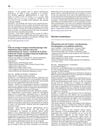 1 citations,
March 2012 in “Revue neurologique”
1 citations,
March 2012 in “Revue neurologique” Proper diet management is crucial for preventing severe symptoms in phenylketonuria.
[object Object]  September 2024 in “Journal of the American Academy of Dermatology”
September 2024 in “Journal of the American Academy of Dermatology” The supplements improved hair density and reduced hair loss.
 July 2024 in “Skin Appendage Disorders”
July 2024 in “Skin Appendage Disorders” The supplement significantly improves hair density and appearance in people with hair loss.
 June 2023 in “Italian journal of dermatology and venereology”
June 2023 in “Italian journal of dermatology and venereology” The oral supplement improved hair loss in patients with telogen effluvium.
March 2021 in “Juniper Online Journal Material Science” Energy healing treatment improved L-cysteine's stability, solubility, bioavailability, and shelf-life.
 January 2021 in “Journal of cosmetology & trichology”
January 2021 in “Journal of cosmetology & trichology” L-(+)-Tartaric Acid may help increase certain hair growth genes without harming cells.

L-PGDS has specific binding sites for its functions and could help in drug delivery system design.
 January 2019 in “Journal of cosmetology & trichology”
January 2019 in “Journal of cosmetology & trichology” L-Cystine and L-Cystine with Kera-Diet® safely improved hair and nail quality in healthy women.
The supplement improved hair density and overall hair beauty.
 January 2019 in “Journal of Pharmacognosy and Phytochemistry”
January 2019 in “Journal of Pharmacognosy and Phytochemistry” The methanolic fruit extract of Citrullus colocynthis contains bioactive compounds that may support its use in traditional medicine and drug development.

Millet extract, wheat germ oil, L-cystine, and calcium pantothenate reduced hair loss and improved hair growth in women with diffuse alopecia.
The combination of millet seed extract, L-cystine, and calcium pantothenate significantly improved hair growth in women with female pattern hair loss.
 146 citations,
May 2002 in “The American journal of pathology”
146 citations,
May 2002 in “The American journal of pathology” Cathepsin L is essential for normal hair growth and development.
 100 citations,
March 2006 in “Journal of biological chemistry/The Journal of biological chemistry”
100 citations,
March 2006 in “Journal of biological chemistry/The Journal of biological chemistry” Cystatin M/E strongly inhibits cathepsin V and cathepsin L, important for skin formation.
49 citations,
July 2007 in “Ophthalmic Plastic and Reconstructive Surgery” Surgical excision is an effective treatment for persistent nodules from poly-L-lactic acid injections.
34 citations,
September 2020 in “Clinical, cosmetic and investigational dermatology” Hyaluronic acid increases collagen synthesis safely, while poly-L-lactic acid may cause complications by affecting fibroblasts.
 30 citations,
July 2001 in “BJUI”
30 citations,
July 2001 in “BJUI” Combination therapy improves urinary flow and reduces residual urine, but needs better stent design.
 13 citations,
February 2018 in “Bio-medical Materials and Engineering”
13 citations,
February 2018 in “Bio-medical Materials and Engineering” Minoxidil inside tiny particles can deliver more drug to hair follicles, potentially improving treatment for hair loss.
6 citations,
February 1997 in “International Journal of Dermatology” Kaposi's sarcoma lesions might originate from benign tissue changes.
[object Object] 1 citations,
January 2019 in “Journal of pharmacy & pharmacognosy research” The flavonoid-rich extract of Equisetum hyemale can help regrow hair in cases of alopecia.
 September 2018 in “Central Asian journal of medical sciences (Print)”
September 2018 in “Central Asian journal of medical sciences (Print)” Urticadioica L extract may enhance human hair growth.
 March 2011 in “Hair transplant forum international”
March 2011 in “Hair transplant forum international” The document's content couldn't be processed for a summary.
 August 1995 in “Journal of The European Academy of Dermatology and Venereology”
August 1995 in “Journal of The European Academy of Dermatology and Venereology” New therapy helps treat hair loss.
 August 1995 in “Journal of The European Academy of Dermatology and Venereology”
August 1995 in “Journal of The European Academy of Dermatology and Venereology” New therapy helps treat hair loss.
 61 citations,
September 2010 in “Fitoterapia”
61 citations,
September 2010 in “Fitoterapia” Extracts from Tridax procumbens L. have strong anti-inflammatory and antioxidant effects and block inflammation-causing enzymes.
 44 citations,
March 2020 in “Antibiotics”
44 citations,
March 2020 in “Antibiotics” Rosemary extracts with carnosic acid and carnosol can reduce the harmfulness of Staphylococcus aureus without stopping its growth.
29 citations,
March 2014 in “PloS one” Astragaloside IV may help prevent hair loss by blocking a specific pathway that leads to cell death.
 21 citations,
November 2021 in “Biomolecules”
21 citations,
November 2021 in “Biomolecules” Eclipta prostrata is a medicinal plant that helps treat diseases, protects the liver and nerves, and promotes hair growth.
 17 citations,
April 2021 in “Clinical Phytoscience”
17 citations,
April 2021 in “Clinical Phytoscience” Chitrak is a medicinal plant with health benefits like fighting microbes, reducing inflammation, and promoting hair growth, but it can be toxic and needs more research.
13 citations,
September 2007 in “Journal of dermatological science”





















